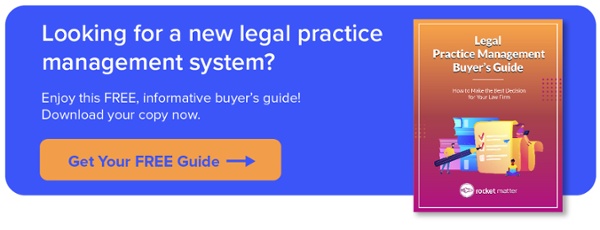Legal Practice Management Software Features: Basics and Beyond

Some small law firms use a duct-taped system of Word, Excel, and Quickbooks to manage their cases. Compared to dedicated Legal Practice Management software, these systems are very inefficient. They don’t, for example, allow you to search for custom fields across your matters. They don’t flow the time you spent on your calendar or tasks directly onto your invoice. They don’t keep running billable time totals, trust balances, pending invoices, and receivables up-to-date as users perform actions.
Legal practice management software can wildly vary in function and style, but fundamentally there is commonality across different applications. If you’re looking to make the switch to a dedicated system, this blog post will help you understand the features that you’ll be able to take advantage of to help run your firm more efficiently.
Legal Practice Management Software Features: The Basics
- Keeping on top of your clients and matters
- Creating and managing documents
- Capturing time
- Running invoices
- Tracking trust account balances
- Checking for conflicts
- Managing your firm with analytics
- Calendaring and managing deadlines
- Tracking your emails
Some platforms, like TimeSolv, focus mostly on time capture and invoicing. Others, like Cosmolex, include features such as full back-end accounting for the firms that don’t want to use Quickbooks. Others, like Rocket Matter, specialize in rich practice management features like project management, business intelligence, and Kanban boards that go beyond what most law firm software offers.
The big picture is that legal practice management systems help law firms not just become more organized, they help them become more efficient.
Beyond the Basics: Additional Value-Adds You Should Consider
Matter Templates
Matter Templates allow you quickly set up matters without a lot of manual configuration. Imagine you’re setting up an estate plan, an H1B visa, or an uncontested divorce. You probably have to do the same things over and over again, some of which are governed by firm policy, others by rules of procedure. Matter templates allow you to define billing arrangements, tasks, calendar events, deadlines, and data fields. Once these are setup, you can instantly create a matter with all of those items ready to go, sparing you the time wasted and human error of manual setup.
Document Assembly
Document Assembly (or Document Automation) gives you the ability to create a document with the push of a button. The way it works is this: you take a document you use over and over again (fee agreements, hearing notices, wills, etc..) and transform it into a fill-in-the-blank template. You can even incorporate if-then-else logic. Then, you can merge the document with data stored in your legal practice management software. It’s a massive time and error-saver and a much-improved version of copying-a-document-and-using-find-and-replace.
Electronic Invoices
Electronic Invoicing saves you the burden of printing invoices, stuffing them into envelopes, addressing them, stamping them, and sending them. With electronic billing, your legal time and billing software generates PDF invoices and shares them with your clients. Invoices can be shared via emails or secure client portals.
When electronic invoices are combined with Electronic Payments, the firm no longer must wait 30-60-90 or more days to receive a check in the mail. The client will sometimes even pay their bills online on the same day. The firm is able to charge the client whenever they want, because they can keep client payment information on file in a secure manner. Billing personnel also don’t need to manually update their ledgers by typing in the received amounts – this happens automatically when an electronic payment is received.
Recurring Billing and Payment Plans
Recurring Billing and Payment Plans enable law firms to establish alternative payment methods with clients. Payment Plans are often popular with family lawyers, criminal defense attorneys, and other consumer-facing law offices. These allow you to keep payment information securely on file and whittle down a large amount in smaller, digestible amounts, on a weekly, monthly, or even a daily basis. Recurring Billing is similar, although you are not chipping away at a large amount. Corporate lawyers sometimes like this option, providing monthly service in return for a monthly fee.
Kanban Boards
Kanban Boards are great for visually-minded lawyers. They help law firms see the status of all of their cases at a glance. They depict matters as virtual index cards, traveling from left to right through different stages of a matter. For example, a lawyer can glance at a Kanban board and see how many of her cases are in discovery, pre-trial, or whatever status she defines. Additionally, when there are too many matters clogging one stage of a Kanban board, this is a signal that this stage of work is a bottleneck and needs to be optimized. For more information about Kanban boards, please see the Rocket Matter e-book Lean Law Firm Basics.
E-Signature
E-Signature is now commonly integrated with legal practice management software. If you’re late to the party, documents as wide-ranging as routine contracts to multi-million-dollar mergers and acquisitions are being signed with electronic signatures. Several states now even have guidelines for wills via e-signature. When an e-signature product is integrated with a legal practice management system, any documents you created via document assembly (see above) or stored for whatever purpose can be easily sent out for signatures.
Reporting, Business Intelligence, and Analytics
Analytics are critically helpful to the management of the law firm when reviewing performance or conceiving strategy. It’s critical to take a look at the reporting capabilities of your candidate software and match them up with the information you need to have on a regular basis. You don’t want to move forward with software and find out a month or two into your usage that it doesn’t have the key report you rely on. Some legal practice management software has more capabilities than others when it comes to reporting, and some, like Rocket Matter, allow users to design their own reports.
Learn more about how legal practice management software features can help boost profitability and productivity. Then, book a free demo by speaking with one of Rocket Matter’s management experts. Our team will assist you in determining the pain points your practice is currently experiencing and recommend practical solutions to help.
Share post:










